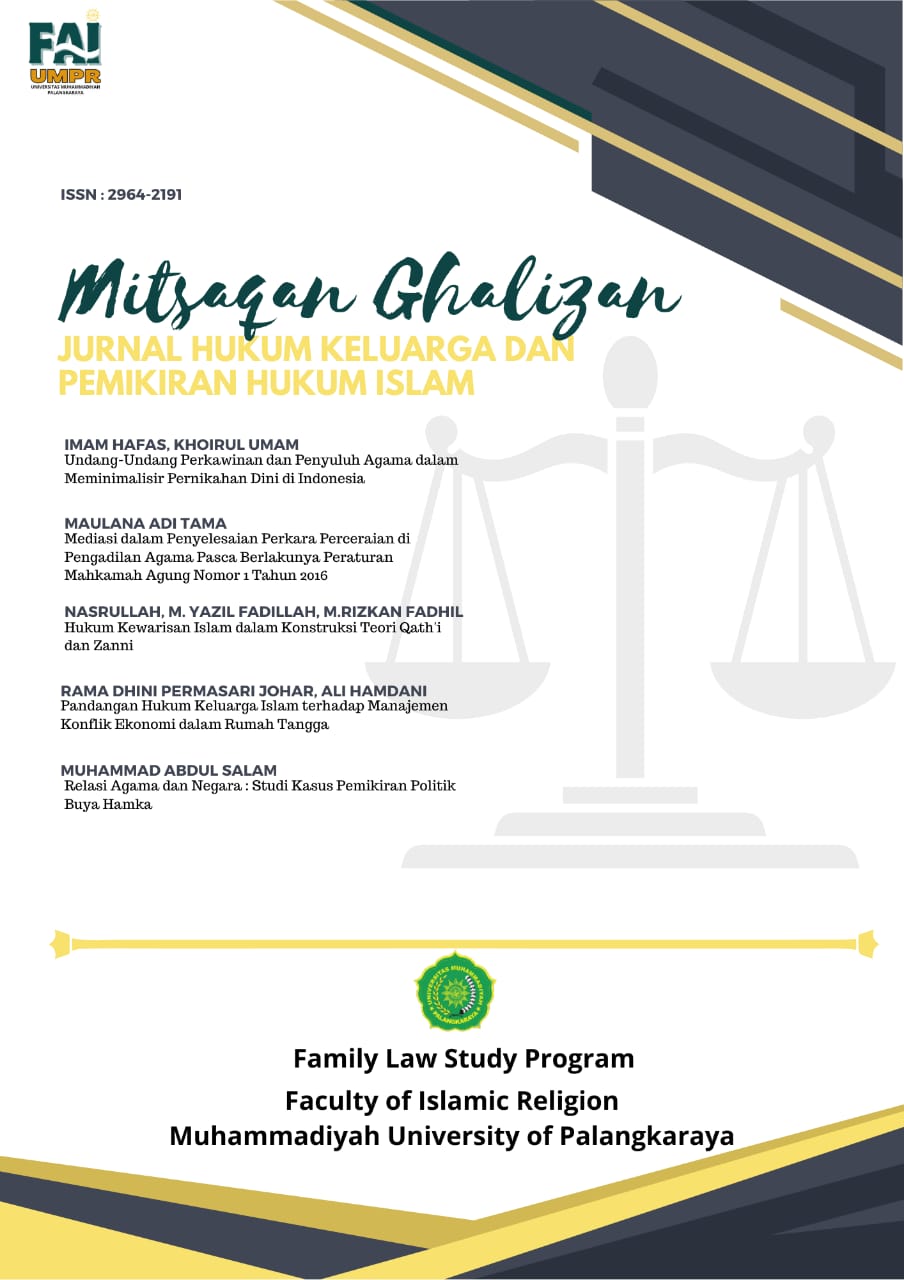Hukum Kewarisan Islam dalam Konstruksi Teori Qath’i dan Zanni Islamic Inheritance Law in Theory Construction of Qath'i and Zanni
Main Article Content
Abstract
In ushul Fiqh the terms qath'i and zhanni are used to describe the sources of Islamic legal texts, both the Qur'an and hadith in two ways namely al-tsubut (existence) or al-wurud (sourced from truth) and al-dalalah (interpretation). In terms of qath'i, zhanni al-tsubut and al-wurud the scholars agree that the Qur'an and mutawatir hadiths are qath'i, while the hadith ahad is zhanni al-tsubut. They differed from al-Dalah in terms of qath'i and zhanni (interpretation). According to the expert scholar Ushl Fiqh, if a religious text (verse of the Qur'an or Hadith) contains only one clear meaning and does not allow room for other interpretations, and mentions certain numbers, then the text is considered qath'i al- dalah. This qath'i al-dalalah category contains religious texts on inheritance law. Whereas contemporary scholars state that qath'i and zhanni al-dalalah in the Qur'an and hadith cannot be seen from the clarity of the meaning of the pronunciation, they can be seen from the desired essence of the pronunciation, which is commonly known as maqasid al-shariah. The maqasid approach must be added to the theory of ta'abbudi and ta'aqquli.
Downloads
Article Details

This work is licensed under a Creative Commons Attribution-ShareAlike 4.0 International License.
References
Abdul Wahab Khallāf. Ilmu Ushūl al-fiqh. Kairo: Maktabah al-Dakwah al-Islamiyah, 1990.
Abi Ishaq al-Syatibi. Al Muwafaqat fi Ushul al Ahkam. Bairut: Dar al-Fikr, t.t.
Akh Minhaji. strategeisfor social research: The methedologi Imagination in Islamic studies. Yogyakarta: Suka Press, 2009.
Akhmad Haries. “Gagasan Pembaruan Dalam Bidang Hukum Kewarisan” 2 (2014).
Asminta Sari Br Sinulingga. “Qath’y dan Zhanny Dalam Kewarisan Islam.” Al-Muamalat Jurnal Hukum dan Ekonomi Syariah IV (2019).
Asy Syhraastāny. al-Milal wa an-Nihal, terj.Ahmad Fahmi Muhammad. Beirut: Dār al Kutub al- „Ilmiyyah, 1992.
Fakhr ad Dîn ar Râzi. al Mahshūl fī ‘Ilm al-Ushūl. Saudi Arabia: Maktabah Nizar Musthafa, 1997.
Hazairin. Sistem Kewarisan Bilateral. Jakarta: Tintamas Indonesia, t.t.
Imam Syaukani. Rekonstruksi Epistimologi Hukum Islam Indonesia. Jakarta: PT Raja Grafindo Persada, 2006.
Manna’ al Qaththan. Pengantar Studi Hadis. Jakarta: Pustaka al Kautsar, 2004.
Masdar F. Agama Keadilan, Risalah Zakat (Pajak) dalam Islam. Jakarta: Pustaka Firdaus, 1991.
Mohammad Hashim Kamali. Principles of Islamic Jurisprudence. Kuala Lumpur: Pelanduk Publication, 1989.
Muhammad Abū Zahrah. Ushūl al-fiqh. Kairo: Dar al-Fikr al-Arabi, t.t.
Muhammad Yusuf Musa. al Tirkah wa al Mirāts Fi al-Islām. Kairo: Dar al Kitab al Arabi, 1959.
al Tirkah wa al Mirats Fi al-Islam. Kairo: Dar al Kitab al Arabi, 1959.
Muhammadun. “Wahbah al-Zuhaili dan Pembaharuan Hukum Islam.” Mahkamah: Jurnal Kajian Hukum Islam 1 (Desember 2016).
Noel J. Coulson. A History of Islamic Law. Edinburg: Edinburg Press, 1964.
Nunung Lasmana. “Wakaf Dalam Tafsir Al-Manar (Penafsiran Atas Surat Al-Baqarah Ayat 261-263 dan Ali Imran Ayat 92).” Al-Tijary : Jurnal Ekonomi Dan Bisnis Islam 1 (t.t.): Juni 2016.
Nur Hayati dan Ali Imran Sinaga. Fiqh dan Ushul Fiqh. Depok: Prenadamedia Group, 2017.
Saefudin Zuhri. Ushūl fiqh, Akal Sebagai Sumber Hukum Islam. Yogyakarta: Pustaka Pelajar, 2009.
Safi Hasan Abū Thālib. Tatbi al-Syarī’ah al Islāmiyah fi al-Bilād al-‘Arabiya. Kairo: Dar al Nahdhah al Arabiyah, 1990.
Wael B. Hallaq. Sejarah Teori Hukum Islam. Jakarta: PT Rajagrafindo Persada, 2009.
Wahbah al Zuhaili. Ushūl fiqh al-Islām. Beirut: Dar al-Fikr, 2001.
